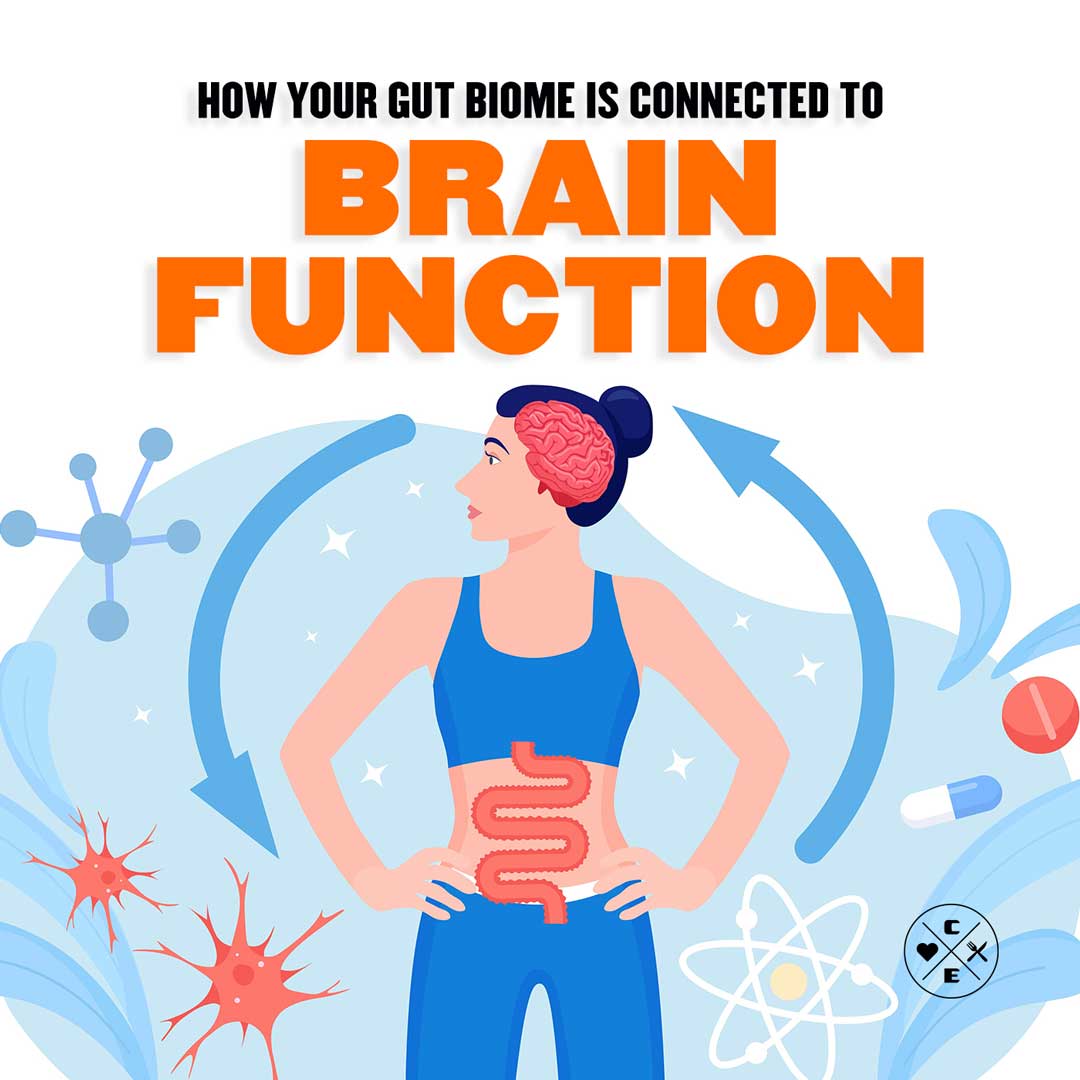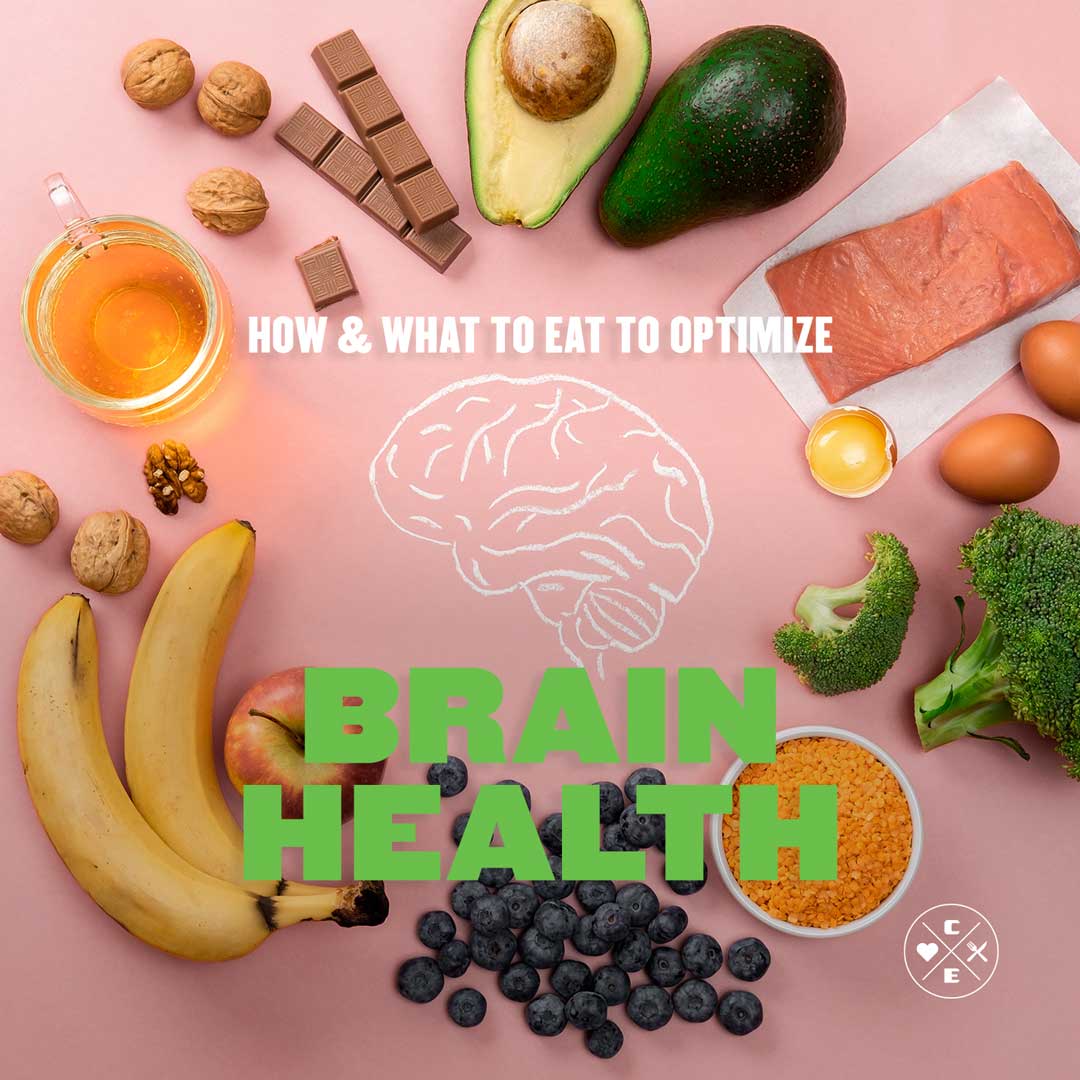
How Your Gut Biome Is Connected to Brain Function
Dorothy M. Shirnyl, RND
Nutrition
|
Mental Health
15 minute read
We often hear phrases like "gut feeling" or "trust your gut," but did you know there's actual science behind these expressions? Your gut and brain are engaged in a constant conversation, a powerful connection known as the gut-brain axis. This intricate network involves not just nerves, but also hormones, immune cells, and even the trillions of microbes residing in your gut - your gut biome.
Understanding this gut-brain connection is key to unlocking the secrets to optimal health. It's no longer just about what you eat; it's about how your gut processes and reacts to your food, and how those reactions influence your brain and overall well-being. How your gut biome is connected to brain function?
In this exploration of the fascinating gut-brain axis, we'll delve into how your gut biome, that bustling community of microbes in your intestines, can influence your brain function, including mood, cognitive abilities, and overall mental health. Here, we will tacke the following:
- The Gut Biome
- Factors Affecting the Gut Biome
- The Gut-Brain Axis
- Gut Microbiome and Mental Health
- Strategies to Improve Gut and Brain Health
- Tips For Reducing Stress To Improve The Gut-Brain Connection
- Future Research and Potential Therapies
The Gut Biome
Your gut is home to a bustling ecosystem of trillions of microorganisms, known as the gut microbiome. This diverse community, nestled within your intestines, plays a vital role in supporting your overall health and well-being. It's like a hidden metropolis, with each microbe contributing to the intricate balance that keeps you thriving.
This complex network of bacteria, viruses, fungi, and other microbes isn't just a passive inhabitant of your digestive tract. It actively influences numerous bodily functions, far beyond just digestion. It impacts how your immune system functions, regulates your metabolism, and even communicates with your brain, influencing your mood and mental health.
The Importance of the Gut Biome in Overall Health
This thriving ecosystem is far more than a passive inhabitant; it's an active and powerful contributor to your overall health. The gut biome plays a starring role in various bodily functions, including:
Digestion and Nutrient Absorption
Gut microbes go far beyond simply aiding in the breakdown of food; they actively participate in the digestive process, acting as a network of microscopic assistants that meticulously break down complex carbohydrates and fibers, transforming them into essential nutrients your body can readily absorb.
By maintaining a delicate balance within this microbial community, you ensure the smooth operation of your digestive system. When this equilibrium is disrupted, digestive issues can arise, highlighting the critical link between a healthy gut microbiome and overall digestive well-being.
A balanced and diverse gut microbiome plays a significant role in preventing:
- Bloating and Gas. Beneficial bacteria aid in the efficient fermentation of fiber, minimizing gas production and discomfort.
- Constipation and Diarrhea. A healthy microbiome helps regulate bowel movements, promoting regularity and preventing extremes.
- Irritable Bowel Syndrome (IBS). Research suggests a link between an imbalanced gut microbiome and IBS, a common disorder characterized by abdominal pain, bloating, and irregular bowel habits.
Immune System Support
Your gut biome serves as a training ground for your immune system. It interacts with immune cells, helping them distinguish between harmful invaders and harmless substances, ultimately strengthening your body’s defenses against infections and illnesses.
Mental and Emotional Health
The gut-brain connection is a two-way communication highway. Your gut microbes produce neurotransmitters and other signaling molecules that can directly impact your brain function, influencing your mood, emotions, and cognitive abilities.
Metabolism and Weight Management
The microbes in your gut play a role in how your body processes and stores energy. A balanced gut microbiome can support a healthy metabolism and contribute to weight management, while imbalances may contribute to weight gain and metabolic issues.
Disease Prevention
A diverse and healthy gut biome helps maintain a strong intestinal barrier, reducing the risk of inflammation and leaky gut. This, in turn, can protect against various diseases, including inflammatory bowel disease (IBD), heart disease, and even certain types of cancer.
Factors Affecting the Gut Biome
Just like a garden, your gut biome thrives when cared for and nurtured. However, it can also become imbalanced when exposed to unfavorable conditions. Several factors can influence the delicate ecosystem within your gut:
Diet
The foods you eat have a profound impact on your gut microbiome. A diet rich in fiber, fruits, vegetables, and fermented foods acts as a feast for beneficial bacteria, promoting their growth and diversity. In contrast, a diet high in processed foods, sugar, and unhealthy fats can starve beneficial microbes and create an environment where harmful bacteria flourish.
Lifestyle
Your lifestyle choices also play a role in gut health. Regular exercise, adequate sleep, and effective stress management can support a thriving microbiome. Chronic stress, lack of sleep, and a sedentary lifestyle can disrupt the balance, potentially leading to dysbiosis and associated health issues.
Medications
While certain medications, like antibiotics, are sometimes necessary to combat infections, they can also wreak havoc on your gut biome. Antibiotics are like a bomb, indiscriminately killing both harmful and beneficial bacteria. This can lead to a decrease in microbial diversity and an increased risk of gut-related problems.
Environment
Your surroundings also matter. Exposure to environmental toxins and pollutants can disrupt the gut microbiome. Additionally, your early life experiences, such as whether you were born vaginally or via C-section, and whether you were breastfed or formula-fed, can have lasting impacts on your gut health.
How Your Gut Biome Is Connected to Brain Function: The Gut-Brain Axis
Beyond its role in digestion, the gut is in constant communication with the brain via a network known as the gut-brain axis. This two-way superhighway allows messages to flow back and forth, influencing everything from your mood to your immune response. It's a complex system with several key players:
- The Vagus Nerve. The vagus nerve is the captain of this communication highway, acting as the primary link between your gut and brain. It carries messages about gut sensations, such as hunger or discomfort, directly to the brain.
- The Enteric Nervous System (ENS). The ENS is sometimes called the "second brain." This network of neurons lining the gut can act independently, managing digestive processes, but it also communicates with the brain via the vagus nerve.
- The Microbiota. Your gut microbes aren't just passive passengers. They play a crucial role in gut-brain communication by producing neurotransmitters, influencing hormone levels, and interacting with immune cells.
How does this communication happen? It's a multi-faceted process involving:
- Neurotransmitters. Gut microbes produce neurotransmitters like serotonin, GABA, and dopamine, which influence mood, stress response, and even cognitive function.
- Hormones. The gut releases hormones like ghrelin and leptin, which regulate appetite and energy expenditure. Gut microbes can influence the production and signaling of these hormones.
- Immune Pathways. The gut microbiome interacts with the immune system, modulating inflammation and immune responses. These immune signals can also travel to the brain, affecting mood and behavior.
The Role of the Vagus Nerve
The vagus nerve is a crucial component of the gut-brain axis, serving as the primary communication channel between your gut and brain. It is a bidirectional pathway that allow messages to flow back and forth. Understanding the role of the vagus nerve is key to unlocking the secrets of the gut-brain connection, as it directly influences how gut sensations and signals impact your brain, and vice versa.
This vital nerve plays a key role in several aspects of gut-brain communication:
- Gut Feelings. That "gut feeling" you experience when you're nervous or excited? That's your vagus nerve in action. It sends signals from your gut to your brain, letting you know something's up.
- Mood Regulation. The vagus nerve carries messages about the state of your gut microbiome to the brain, which can directly influence your mood and emotional well-being.
- Stress Response. Stressful situations can trigger signals from the brain to the gut via the vagus nerve, leading to that familiar "butterflies in the stomach" sensation.
- Appetite Control. The vagus nerve also helps regulate hunger and satiety signals.
The influence of your gut on your brain goes far beyond just 'gut feelings'. It directly impacts the production of vital neurotransmitters, those chemical messengers responsible for everything from mood regulation to memory. Here's how:
- Neurotransmitter Production. Your gut microbes are like tiny factories, churning out key neurotransmitters such as:
- Serotonin. This "feel-good" chemical is largely produced in the gut and plays a role in mood regulation, sleep, and appetite.
- GABA. This inhibitory neurotransmitter helps calm the nervous system, reducing anxiety and promoting relaxation.
- Dopamine. Associated with reward and motivation, dopamine plays a role in feelings of pleasure and focus.
- Norepinephrine. This neurotransmitter is involved in alertness, focus, and the fight-or-flight response.
How Gut Inflammation Can Lead to Brain Inflammation and Affect Cognitive Function?
When inflammation flares up in your gut, it can have a ripple effect, impacting the health of your brain and cognitive abilities. Here's how this chain reaction works:
- Leaky Gut. An unhealthy gut often develops a 'leaky' barrier. This barrier acts like a net, designed to keep potentially harmful substances, like toxins and bacteria, from entering the bloodstream. When the gut lining becomes inflamed, this net develops holes, allowing these substances to leak through.
- Systemic Inflammation. Once in the bloodstream, these inflammatory molecules can travel throughout the body, reaching the brain. This sets off an inflammatory response in the brain, which can have serious consequences.
- Brain Fog and Cognitive Decline. Brain inflammation is linked to various cognitive problems, including:
- Difficulty concentrating and focusing
- Memory problems and forgetfulness
- Brain fog and mental fatigue
- Increased risk of neurodegenerative diseases like Alzheimer's and Parkinson's
Gut Microbiome and Mental Health
Your gut and your brain may seem like separate worlds, but research is revealing a surprising connection between them. An increasing body of evidence suggests that the health of your gut microbiome can directly impact your mood, emotions, and overall mental well-being. It's a fascinating link that's transforming our understanding of mental health and offering new possibilities for treatment.
The Connection Between Gut Health and Mood Disorders
Recent studies have shown a strong correlation between an imbalanced gut microbiome (dysbiosis) and various mood disorders, including:
- Anxiety and Depression. People with these conditions often exhibit a less diverse gut microbiome with lower levels of beneficial bacteria.
- Autism Spectrum Disorders (ASD). Children with ASD frequently experience gastrointestinal issues and may have alterations in their gut microbiome composition.
- Stress-Related Disorders. Chronic stress can disrupt the gut microbiome and contribute to anxiety and depression.
The Gut Bacteria and Cognitive Function
Research is shedding light on the intricate connection between gut bacteria and the brain. This communication pathway involves various mechanisms, including the production of neurotransmitters, modulation of the immune system, and the vagus nerve.
Studies have indicated that the gut microbiome can influence memory, learning, and the risk of cognitive decline. Key findings include:
- Short-chain fatty acids (SCFAs). Produced by certain gut bacteria, SCFAs have been shown to improve memory and learning abilities.
- Neurotransmitters. The gut microbiome plays a role in producing neurotransmitters like serotonin and GABA, which are vital for mood regulation, learning, and memory.
- Inflammation. An imbalance in gut bacteria can lead to chronic inflammation, which has been linked to cognitive decline and neurodegenerative diseases.
- Stress. The gut microbiome is sensitive to stress, and chronic stress can negatively impact its composition and function, potentially affecting cognitive abilities.
The Gut-Brain Axis in Stress Response
The gut and brain are deeply connected, constantly communicating through a network called the gut-brain axis. Our gut bacteria play a crucial role in this connection, influencing how we respond to stress.
A healthy gut microbiome helps produce calming neurotransmitters and regulates the body's stress response. When we're stressed, though, it can disrupt our gut bacteria balance, leading to inflammation and further increasing our susceptibility to stress. This creates a vicious cycle where gut problems worsen stress, and stress worsens gut problems.
Strategies to Improve Gut and Brain Health
Nurturing the intricate connection between gut and brain requires a multi-faceted approach that goes beyond simply popping a pill. In this section, we delve deeper into practical and effective strategies that focus on dietary choices, supplementation with probiotics and prebiotics, and mindful lifestyle adjustments to optimize both gut and brain health.
1. Dietary Interventions
The foundation of a healthy gut and brain lies in the food we consume. Specific foods nourish beneficial gut bacteria, reduce inflammation, and support cognitive function.
Foods that Support a Healthy Gut Biome
- Fiber-rich foods. Fruits, vegetables, whole grains, legumes, nuts, and seeds provide prebiotics, which are non-digestible fibers that serve as food for beneficial gut bacteria. This promotes a balanced gut microbiome, crucial for overall health and brain function.
Aim for at least 25-35 grams of fiber per day. Include various sources like fruits, vegetables, whole grains, and legumes in your diet.
- Fermented foods. Yogurt, kefir, sauerkraut, kimchi, and kombucha contain live cultures of beneficial bacteria that can directly enrich your gut microbiome. These foods also aid digestion and enhance nutrient absorption.
The Mediterranean Diet
This dietary pattern, abundant in fruits, vegetables, whole grains, legumes, fish, nuts, and olive oil, has been widely studied for its numerous health benefits, including improved gut and brain health. Here’s how this diet can help improve gut-axis function.
- It Has Anti-inflammatory Effects. The Mediterranean diet reduces inflammation, protecting both the gut and the brain from damage.
- It Promotes Gut Microbiota Balance. The abundance of fiber and polyphenols in this diet fosters a healthy gut microbiome.
- It Has Cognitive Benefits. Research suggests that the Mediterranean diet can improve memory, attention, and overall cognitive function, potentially reducing the risk of neurodegenerative diseases.
You can explore and adopt a Mediterranean diet. Make gradual shifts toward a Mediterranean-style eating pattern, prioritizing plant-based foods, healthy fats, and lean protein sources.
2. Lifestyle Changes
Cultivating a healthy gut-brain connection requires more than just dietary modifications and probiotic supplements. The way we live our lives plays a vital role in fostering optimal gut and brain function. Here are the impacts of exercise, sleep, and stress management on your gut biome:
- Exercise. Regular physical activity can improve gut motility, enhance nutrient absorption, reduce inflammation, and support a diverse gut microbiome. Exercise also promotes the production of brain-derived neurotrophic factor (BDNF), a protein essential for brain health and cognitive function.
- Sleep. During sleep, your body repairs and restores itself, including the gut and brain. Adequate sleep is crucial for maintaining a healthy gut microbiome and promoting optimal cognitive function, memory consolidation, and emotional regulation.
- Stress Management. Chronic stress negatively affects both gut and brain health. It can disrupt the gut microbiome, impair gut function, and increase inflammation throughout the body, including the brain. Effective stress management techniques can help regulate the gut-brain axis and promote overall well-being.
Tips For Reducing Stress To Improve The Gut-Brain Connection
Beyond nourishing food and targeted supplements, cultivating a mindful and active lifestyle plays a pivotal role in fostering a healthy gut-brain axis. Let's explore practical tips for managing stress, improving sleep, and incorporating movement into your daily life to unlock the full potential of your mind and body.
- Mindful Living. Incorporate practices like meditation, deep breathing, or mindful eating to reduce stress and promote gut health.
- Gentle Movement. Engage in activities like yoga or tai chi, which combine movement with breath to support relaxation and digestion.
- Time in Nature. Spend time outdoors to reduce stress and foster a balanced gut microbiome.
- Social Connections. Nurture meaningful relationships for emotional well-being and a positive impact on gut health.
- Creative Expression. Pursue hobbies and activities that bring you joy and provide a healthy outlet for stress.
- Prioritize Sleep. Establish a consistent sleep routine for optimal gut and brain health.
- Stay Active. Engage in regular physical activity to support gut motility and reduce stress levels.
Future Research and Potential Therapies
The gut-brain axis is a hotbed of research, with scientists uncovering new insights at a rapid pace. Here are a few exciting areas currently under investigation:
- Microbiome Mapping. Imagine having a personalized map of your gut, showing all the different microbial communities and how they interact. This is what scientists are working towards with microbiome mapping, which could revolutionize personalized medicine for gut and brain health.
- Psychobiotics: Mood-Boosting Bacteria. Researchers are exploring the use of special probiotics, known as "psychobiotics," to directly impact brain function and mood. This could open up new, natural avenues for managing anxiety and depression.
- Fecal Microbiota Transplantation. While it might sound a bit unusual, transferring healthy gut microbes from one person to another (FMT) is showing real promise for treating a range of gut and brain disorders.
Conclusion
Your gut biome is a thriving community of trillions of microorganisms living within your intestines. This complex ecosystem, unique to each individual, actively contributes to your health in many ways. It aids in digestion, boosts your immune system, influences your mood and mental well-being, regulates your metabolism, and even helps protect against various diseases.
Nourish Your Microbiome, Nurture Your Well-being
The gut-brain connection is a powerful reminder that our bodies are interconnected in incredible ways. Let's build a community of support and shared knowledge! Share this article with your friends and family, and let's spark a conversation about the importance of gut health for overall well-being. Together, we can nurture our gut microbiomes and unlock the full potential of our mind-body connection.
Explore Clean Eatz Kitchen's diverse meal plans and discover a world of delicious, healthy, and convenient meals at an affordable price.
Build Your Meal Plan today and start your journey towards a healthier lifestyle!
Related Articles
How and What to Eat to Optimize Brain Health?
16 minute read
The Connection Between Gut Health and Weight Loss
8 minute read



